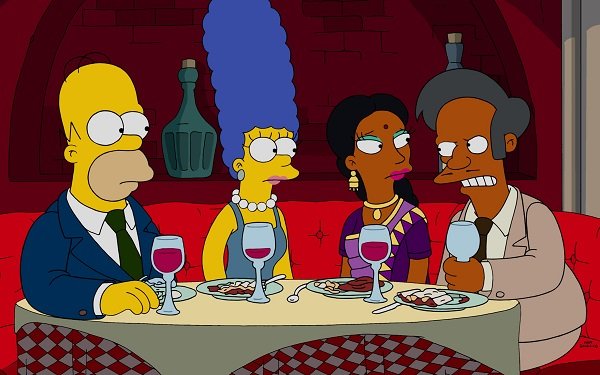
A ridiculous “controversy” over the portrayal of Apu on “The Simpsons” speaks volumes about a younger generation's overblown sensitivity to just about everything.
First, a disclaimer: I am not Indian-American. As a result, I cannot fully know an Indian-American's experience of seeing Apu go about his life on this cartoon show.
Having said that, it
seems to me the energy some have expended lately to air their objections about the portrayal of Apu represents a great deal of energy wasted.
In a recent TV Blog, I complained about
today's culture of vigilantism and outrage. The context was the withdrawal of advertisers from Laura Ingraham's Fox News Channel show in response to a tweet she posted that denigrated one of the
survivors of the Marjory Stoneman Douglas High School tragedy in Florida.
advertisement
advertisement
Today's topic is much less serious. It has to do with a caricature on a cartoon show that has been a part of our
mass-cultural lives for 30 years.
For most of that time, no one batted an eyelash over the way Apu, proprietor of this cartoon town’s fictional Kwik-E-Mart, was depicted.
He was
just one of many comedic characters seen on “The Simpsons,” which has long been one of the finest shows in the history of television -- brilliantly rendered, written and
voice-acted.
Among the show’s greatest episodes were some in which Apu was prominently featured, including a 1995 episode in which Paul and Linda McCartney guest-starred, and the
one in 1997 in which Apu was married in a Hindu ceremony in the Simpsons’ backyard.
There are likely many more, but “The Simpsons” has produced well over 600 episodes, which
presents a challenge to anyone who would make sweeping generalizations about the portrayal of any one character.
Nevertheless, a number of so-called critics have come out of the woodwork
lately to condemn the entirety of the “Simpsons” canon for what they feel is a racist portrayal of Apu. They seem to focus primarily on his voice, which is provided by Hank Azaria.
But they also come to far-reaching conclusions about what they see as the great harm done by Apu to the greater society.
The impetus for this revived discussion about Apu was a short scene
in a new “Simpsons” episode a week ago that many interpreted as the show's “answer” to the Apu criticism.
Whether it was or it wasn't, the TV Blog's opinion on
this kind of thing is consistent: The producers and the writers of “The Simpsons” are free to comment on our culture, including political correctness, in any manner they choose to, as long
as the commentary is funny, which it was. Comedy is the primary mission of “The Simpsons.”
In that context, Apu is a very funny character, as are the whole Simpson family and
dozens of other characters, from Chief Wiggum to Krusty the Clown.
Krusty is Jewish, which figures into a great deal of the comedy surrounding him. Occasionally, his orthodox father shows up,
voiced by the great Jackie Mason in as stereotypical a fashion as Mason can muster.
If any Jews have complained about this, then I have not heard about it. Maybe it’s because comedy is a
business Jews know and understand very well.
In fact, I have long generalized about Indian people that they are a joyous, humor-loving people as well. I am sorry if this compliment offends
anyone.
The pain elicited by the scene in “The Simpsons” was so sharp to some that it elicited numerous examples of breathless hyperbole.
One writer of Indian descent
actually wrote that Apu “tragically defined both how our white peers related to people of South Asian descent and even informed how we understood our place as immigrant families in America. I am
willing to bet that nearly every brown kid growing up in this country has been subjected to a white person saying, ‘Thank you, come again!’ ”
My advice to her: Don't take
that bet because you will surely lose.
Note the hyperbolic application of words such as “tragically,” as if Apu could wreak a tragedy on anyone, and the phrase “every brown
kid.” Every one? This is the way writers and commentators of a certain younger generation express themselves these days.
It is rarely measured or accurate. And one gets the
feeling that at least some of the outrage they express in the media is feigned.
Generally speaking, they often come across as if they don't know what they are talking about, although they have
a vague sense that what they are ranting about will play well with their peers.
Meanwhile, the rest of us are making sweeping generalizations of our own about the younger generation: They sure
seem like a humorless bunch sometimes, don't they?
The view from here is: Leave Apu alone. He is a joyous, lovable figure and a pillar of his Springfield community. Why not save all the
vitriol for things that really matter?